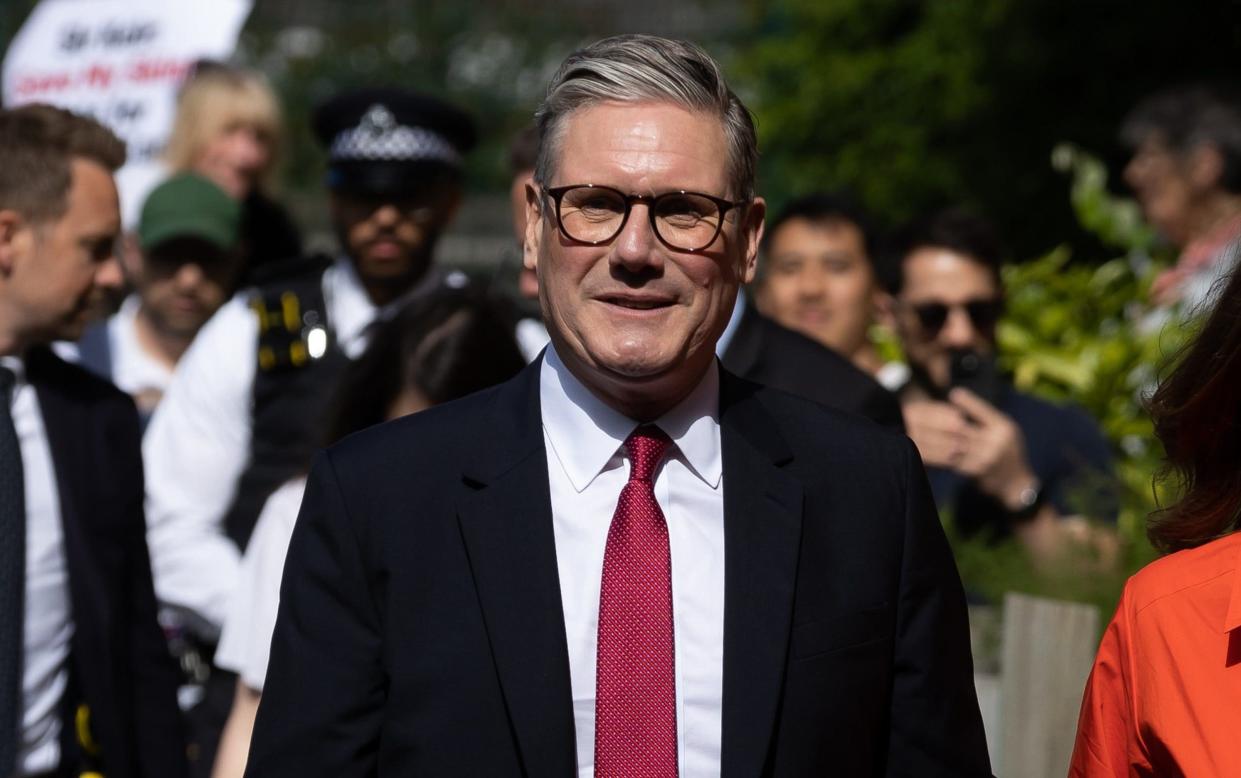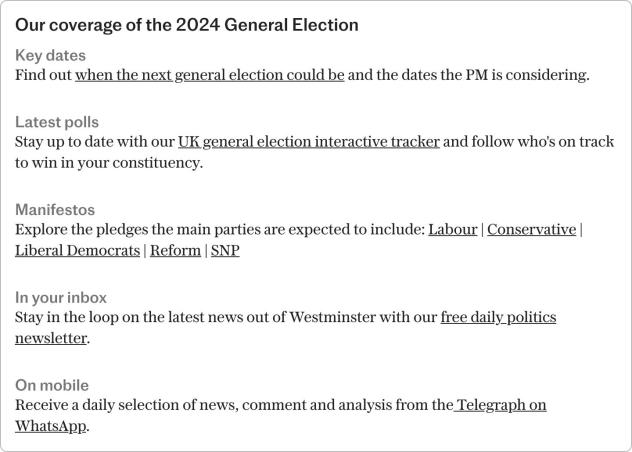Labour on track to secure biggest swing in modern history

Sir Keir Starmer is expected to secure the biggest swing from one party to another in modern history, with Labour’s victory described as an “electoral meteor” hitting Britain.
The 170-seat majority predicted in exit polls, with 410 Labour seats, is uncannily similar to the numbers achieved by Sir Tony Blair in his historic 1997 landslide.
But while Sir Tony managed a 10.2 percentage point swing in 1997 – the biggest since the war – Sir Keir was on course to smash that mark on Thursday night.
Lord Mandelson, who helped mastermind Sir Tony’s three general election wins, said he was “gobsmacked” by the exit poll, telling the BBC: “An electoral meteor has now struck planet Earth.”
He added: “In a sense it’s not surprising, given everything the country has gone through over the past 10 years. I think it would have required Superman as leader of the Conservative Party to lead them back to some sort of victory, and Mr Sunak is not Superman.
“This is an extraordinary achievement for Keir Starmer and his team.”
The results suggested that Labour could become the biggest party in England, Scotland and Wales – the first time in 23 years.
Lower vote share than Corbyn
Ironically, the peculiarities of electoral arithmetic mean Sir Keir’s landslide might have been achieved with a lower overall vote share than Jeremy Corbyn managed in 2019, when he led the party to its worst defeat since 1935.
Electoral Calculus estimates published by GB News on Thursday evening suggested Labour had secured 36.1 per cent of the national vote share, with the Tories on 25.8 per cent, Reform UK on 17.2 per cent and the Liberal Democrats on 9.4 per cent. Mr Corbyn managed a 40 per cent vote share in 2019.
What matters, though, is vote share in individual seats, and Labour appeared on Thursday to have pulled off the all-important trick of making sure it had enough votes in enough seats to win, whereas Reform, with almost twice as big a share of the vote as the Lib Dems, was predicted to win fewer than a quarter as many seats as Sir Ed Davey’s party.
The early results backed up the exit poll. Bridget Phillipson, the shadow education secretary, was re-elected in Houghton and Sunderland South with an increased majority, while in Blyth and Ashington – a new seat – Ian Lavery won for Labour with a majority of more than 9,000.
Sir Robert Buckland, the former justice secretary, lost to Labour in the newly-created Swindon South seat, having held a majority of 6,625 in the old seat of South Swindon, which he had represented for 14 years.
To everyone who has campaigned for Labour in this election, to everyone who voted for us and put their trust in our changed Labour Party - thank you. https://t.co/q6yDNPnAbo
— Keir Starmer (@Keir_Starmer) July 4, 2024
A bigger swing than 1997
Sir Keir’s predicted 410 MPs – up 209 on the last election – compares with 418 Labour MPs in 1997, which was a gain of 146 on 1992. Labour won 412 seats in 2001. A 170-seat majority would be just nine short of the 179 managed by Sir Tony in 1997.
However, Labour needed a bigger swing than that achieved by Sir Tony in 1997 just to achieve a single seat majority – something many had predicted could not be achieved in a single leap when Boris Johnson secured his 80-seat majority in 2019.
Five years after its worst defeat in almost a century, Labour is celebrating what appears to be its second-biggest majority in history, while it is the Tories who are stunned by their worst result in centuries.
Lord Mandelson said: “Nobody in 2019, nobody would have imagined this was possible.”
Even more recently, in 2021, Labour was defeated in the Hartlepool by-election, leaving Sir Keir contemplating resigning as he doubted he was the right person to take the party forward.
At that point, only three years ago, some commentators pondered whether Labour was finished as a party, while others suggested it would take a decade to get back to a position where it could win general elections.
Sir Keir had been regarded by many in his own party as a caretaker who could improve their fortunes in opposition before handing over to a younger leader. Now, the 61-year-old may have every right to be contemplating a decade in No 10.
Former Labour leader Lord Kinnock described it as “the biggest comeback since Lazarus”.
As Labour prepared to govern, Wes Streeting, the shadow health secretary, said of the NHS: “The scale of the challenge is daunting.”
A handful of Labour seats were under pressure, however, including Islington North, where Jeremy Corbyn, now an independent, appeared to have a good chance of retaining his seat. Thangam Debbonaire, a shadow cabinet minister, was at risk from the Green Party in Bristol Central.
SNP bloodbath
One of the stories of the night came in Scotland, where the SNP was predicted to lose 38 Westminster seats and be left with just 10 after a huge resurgence for Labour north of the border.
Labour’s national campaign chief Pat McFadden said: “Keir Starmer’s transformation of the Labour Party has been remarkable.
“He has put country before party and has transformed Labour from a party focused on itself to one back in the service of the British public. We have campaigned as a changed Labour Party, ready to change Britain.”

Despite the exit poll indicating a landslide win, he added: “It’s going to be a long night, and it will be several hours until we know the full picture of results.”
Angela Rayner, Labour’s deputy leader, said: “The ability and the opportunity to serve the British people and to bring about that change they’re desperate for would be an absolute privilege for me, but I’m not counting my chickens until we’ve got those results coming in.”
Lib Dems on course for 61 seats
Although Labour’s numbers were comparable to those achieved by Sir Tony in 1997 and 2001, the picture for other parties was very different.
The Lib Dems were predicted to win 61 seats, an increase of 53, while Reform UK was on course to take 13 – chopping down the Tory vote share and leaving them with a predicted 131 MPs. That is the lowest number since 1832, when the Duke of Wellington led the party.
Labour’s predicted victory was built on huge gains across the Midlands and the North, winning back the “red wall” seats that had been convinced to vote Conservative in 2019 by Boris Johnson’s call to Get Brexit Done – but Sir Keir also appeared to have made gains in traditional Tory territory, including in rural seats.
Nicola Sturgeon, the former SNP leader, said Sir Keir and his team would be “ecstatic” about the result but would soon feel “literally overwhelmed” by the responsibilities of government.
She said: “All of the problems you have until that moment you have been commenting on and blaming someone else for, they’re suddenly in your in-tray, and you’re the one that has to try to work out a way through them, navigate a way forward.”


 Yahoo News
Yahoo News 
